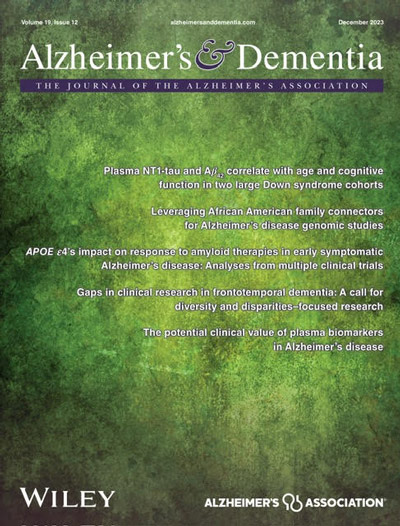摘要
简介:横断面研究很难区分痴呆症发病前的分子变化和发病后的分子变化。 方法 我们研究了两个大型纵向队列中血液 DNA 甲基化(DNAm)的差异和痴呆症的发病情况:弗雷明汉心脏研究(FHS)的后代队列和阿尔茨海默病神经影像学倡议(ADNI)研究。我们分析了 1000 名认知功能未受损的受试者的血液 DNAm 样本。 结果 Meta 分析确定了 44 个 CpGs 和 44 个差异甲基化区域与两个队列中痴呆症的发生时间一致。我们的综合分析确定了痴呆症的早期过程,如免疫反应和代谢功能障碍。此外,我们还开发了一种基于甲基化的风险评分,即使在考虑了年龄、性别、载脂蛋白 E ε4、受教育年限、基线诊断和基线迷你精神状态检查评分后,该评分仍能在独立验证组中成功预测未来的认知能力下降。 讨论 DNAm 为痴呆症风险评估提供了一种有前景的生物标志物。 亮点 血液DNA甲基化(DNAm)在单个CpGs和不同甲基化区域的差异与痴呆症的发生有显著相关性。 通路分析表明,与痴呆症发病相关的DNAm差异在涉及免疫反应和代谢过程的生物通路中明显富集。 样本外验证分析表明,即使考虑了年龄、性别、载脂蛋白 E ε4、教育年限、基线诊断和基线迷你精神状态检查得分,基于甲基化的风险评分仍能在独立数据集中成功预测未来的认知能力下降。

INTRODUCTION
Distinguishing between molecular changes that precede dementia onset and those resulting from the disease is challenging with cross-sectional studies.
METHODS
We studied blood DNA methylation (DNAm) differences and incident dementia in two large longitudinal cohorts: the Offspring cohort of the Framingham Heart Study (FHS) and the Alzheimer's Disease Neuroimaging Initiative (ADNI) study. We analyzed blood DNAm samples from > 1000 cognitively unimpaired subjects.
RESULTS
Meta-analysis identified 44 CpGs and 44 differentially methylated regions consistently associated with time to dementia in both cohorts. Our integrative analysis identified early processes in dementia, such as immune responses and metabolic dysfunction. Furthermore, we developed a methylation-based risk score, which successfully predicted future cognitive decline in an independent validation set, even after accounting for age, sex, apolipoprotein E ε4, years of education, baseline diagnosis, and baseline Mini-Mental State Examination score.
DISCUSSION
DNAm offers a promising source as a biomarker for dementia risk assessment.
Highlights
- Blood DNA methylation (DNAm) differences at individual CpGs and differentially methylated regions are significantly associated with incident dementia.
- Pathway analysis revealed DNAm differences associated with incident dementia are significantly enriched in biological pathways involved in immune responses and metabolic processes.
- Out-of-sample validation analysis demonstrated that a methylation-based risk score successfully predicted future cognitive decline in an independent dataset, even after accounting for age, sex, apolipoprotein E ε4, years of education, baseline diagnosis, and baseline Mini-Mental State Examination score.

 求助内容:
求助内容: 应助结果提醒方式:
应助结果提醒方式:


